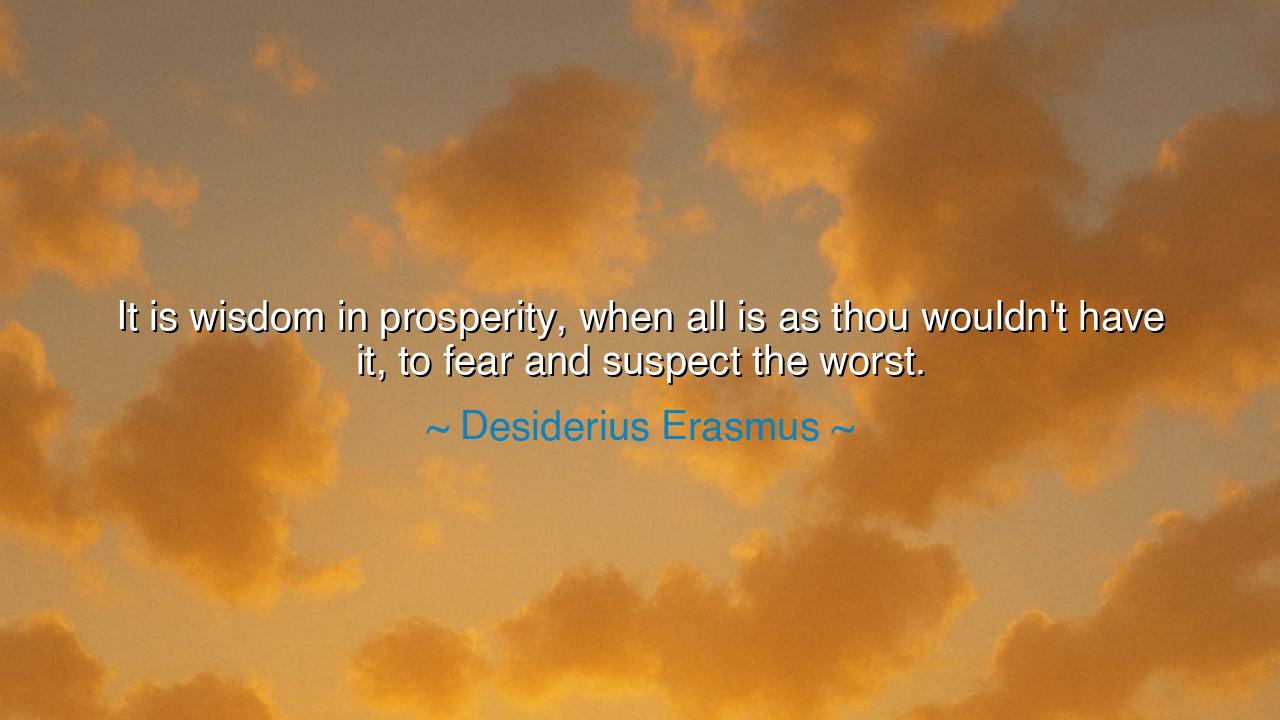
It is wisdom in prosperity, when all is as thou wouldn't have
It is wisdom in prosperity, when all is as thou wouldn't have it, to fear and suspect the worst.






O Seekers of Truth and Clarity, heed the words of Desiderius Erasmus, who speaks with the wisdom of one who understands the fickle nature of fortune: "It is wisdom in prosperity, when all is as thou wouldn't have it, to fear and suspect the worst." In this powerful truth, Erasmus reminds us that in times of success, when the world seems to be aligned with our desires, it is still wise to remain cautious and alert. Prosperity—the blessings of wealth, power, or fortune—can blind us to the dangers that lie ahead. Erasmus teaches that in these moments of ease, we must remain vigilant, for the seeds of misfortune can grow unnoticed even in the richest soil.
Consider, O Children, that prosperity is often a test of the soul. When all is well, it is easy to fall into complacency, to trust that the good times will last forever. But the wise know that fortune is ever-changing. Success can be a fleeting visitor, and it is in times of abundance that we must guard against hubris and overconfidence. The true measure of a person’s wisdom is not in how they handle adversity, but in how they prepare for the inevitable cycles of rise and fall. The wise do not let their guards down in prosperity, for they know that a storm can arrive even in the clearest of skies.
Look to the example of King Croesus of Lydia, whose wealth was unparalleled in the ancient world. His riches were so vast that he believed himself to be the happiest and most fortunate of men. Yet, when the Persian king Cyrus came to his door, Croesus was undone by his own confidence in his fortunes. He failed to prepare for the unpredictability of fate, and in a moment of blindness to the dangers around him, he lost everything. His story stands as a somber reminder that those who bask in prosperity without fear of the worst are often the first to fall when fortune turns.
And so, O Seekers, let us understand this deep truth: prosperity does not guarantee safety, and success does not promise permanence. In times of ease, it is not a sign of weakness to fear or suspect the worst; it is a sign of wisdom. To remain humble and vigilant, even when all seems well, is the hallmark of the truly wise. Erasmus calls us to acknowledge that fortune is fickle, and to prepare ourselves for the changes that are sure to come.
Let us, therefore, take heed of Erasmus's counsel: in times of prosperity, let us not forget the fragility of our position. Let us live with the wisdom to remain humble, to expect the unexpected, and to prepare for the eventual storms. In this way, we will navigate the world not with arrogance, but with the quiet strength that comes from knowing that all things—success, failure, and everything in between—are part of the eternal cycle of life. The wise know that fortune is a river, flowing swiftly, and they who know how to swim will never be swept away.






TKThu Kim
Thinking like a founder, the line sounds like a playbook for risk management during hypergrowth. But operationalizing it is tricky. If leadership over-indexes on downside scenarios, teams can become timid, missing compounding opportunities; under-index, and blind spots explode. What frameworks would you recommend—pre-mortems, red teaming, antifragile design—and how often should they run without dampening momentum? Which metrics signal that vigilance is adding value rather than stifling initiative? I’m seeking a cadence that keeps organizations bold and buffered simultaneously.
TDHa Ngoc Thuy Duong
There’s an ethical angle I can’t shake. If fortune tilts our way, is it virtuous to keep watch for downturns, or does that focus crowd out gratitude, generosity, and responsibility to others? Does constant hedging subtly justify hoarding, under the banner of prudence? I’d appreciate a perspective that balances preparedness with outward-facing action: sharing gains, building community buffers, and investing in resilience beyond the self. What practices keep caution from shrinking one’s moral circle when times are good?
Hhuyen
Emotionally, this hits a nerve. People with a scarcity background often brace for impact even during good times. How do we distinguish disciplined contingency planning from anxiety wearing a rational mask? Where’s the line between Stoic premeditation and clinical catastrophizing? Could you suggest a mental health checklist—signals that it’s time to pause risk rehearsal and practice savoring, plus techniques for returning to planning without spiraling? I want guidance that respects psychological well-being while retaining the practical benefits of readiness.
LNTo Le Na
I’m curious about historical context. Erasmus wrote in a world of plague, religious turmoil, and fickle patronage. Does that turbulence make his caution more situational than universal? In relatively stable systems with social safety nets, does his stance risk encouraging needless pessimism? Or is it timeless because volatility always lurks, just in new forms—cybersecurity, supply chains, climate? I’d like a perspective that contrasts Renaissance precarity with modern risk instruments (insurance, diversification), and tells me when his counsel is ethically sound versus unnecessarily self-protective.
TTRANHTU
As a reader, I feel the pull between prudence and joy. I get the wisdom of scanning horizons when life finally feels stable, but how do we keep that vigilance from turning into a habit of dread? What’s the practical boundary between a healthy pre-mortem and corrosive rumination? If you were advising a friend after a big promotion, would you tell them to start listing failure modes tonight, or to celebrate first and schedule risk checks later? I’d love a concrete rubric that preserves gratitude while still making room for disciplined foresight.